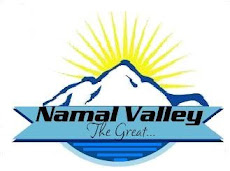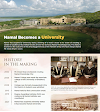Ali Zafar named ambassador for Namal Knowledge City
Singer Ali Zafar was appointed as ambassador to the Namal Knowledge City, a centre of academic educational excellence for the marginalised population residing in remote areas of the Mianwali.
Vision of Namal Knowledge City
The vision of Namal Knowledge City by Founder of Namal University Imran Khan is innovation for the benefit of the society, by establishing top level education facilities of international standard with the help of international partner, the University of Bradford, UK andthe national partner LUMS, Lahore.
Ar. Tony Ashai was designer for a Master Plan based on the international building standards and environmental sustainability in all areas of design and construction.
Fundamental driver for the educational and economical growth
This idea will be a fundamental driver for the educational and economical growth and societal welfare. Namal Knowledge city is located near Salt Range Dhak Mountains Hills near village Rikhi Mianwali Pakistan. Namal Knowledge City is a great venture for education with employability. It aims to deliver a unique learning experience within an inspiring physical and intellectual environment underpinned by the concepts and practice of diversity, employability, enterprise and sustainable development across the curricula. Students will be equipped with enhanced skills and confidence to progress in the workplace and with the passion to continue learning.
One of the main objective of Namal Knowledge City is to strategically develop sustainable research. Knowledge city aims to nurture a healthy research environment by exploiting its partnerships with National, International and other esteemed research active institutes which will assist in improving high quality education and attract quality students.
Namal Knowledge City will provide new opportunities to engage collaboration with employer organisations and key partners across the public and private sectors and will strengthen its links with business through effective knowledge transfer and Retention.
It aims to provide strong, innovative and supportive Information Technology and administrative services and system advance processes which are adaptive to change and which support and enable flexible modes of learning and working. Namal Knowlwdge city will ensure to deliver professional and student-focused services and a top standard of communication, soft skill, governance and decision making through effective management structure and committees.
The development of Namal Knowledge City will be completed in three phases.
Phase-1
The journey of NKC started with the inauguration of Namal College in Phase-1 offering short certificate courses and Diploma in higher education programmes.
Phase-2
Undergraduate and postgraduate degree programmes in different disciplines are launched in Phase-2. One of the main activities of Phase-2 are Namal College staff development for the effective delivery of advance courses. All Namal academic staff will be equipped with the training programme whereas staff without doctoral level qualification will be registered into PhD.
Academies for professional training and qualifications and links with industrial partners will be established to promote knowledge transfer at local and national level. One of the major milestones during Phase-2 will be to apply for a University Charter.
Phase-3
This will be followed by establishing a technology park, enterprises and commercial areas during Phase-3.
Master Plan of Namal Knowledge City
Owing to the challenging topographical conditions of the region, comprising of salt range hills, ridges, and ravines, Ar. Tony Ashai has designed each aspect of the Master Plan keeping in mind factors such as easy accessibility, beauty, connectivity, levels, vistas, and user requirements in order to ensure the best possible experience for each individual.
The Salt Hill mountain dividing the land from the center , Ar. Tony Ashai has used this natural Salt Range Dhak Hill feature to his advantage and has separated the academic side from the residential side referred to one North Campus and 2nd as South Campus respectively.
North Campus
South Campus
The South Campus will be a community town center comprising of retail shops, eateries, and associated are facilities accompanied by student hostels, faculty apartments/townhouses, recreational clubs, shops and residential area for both students and faculty.
These both campuses are easily accessible through a main circular road, this division helps the users associate with North Campus as a place of work and education and South Campus as a place of residence










0 Comments